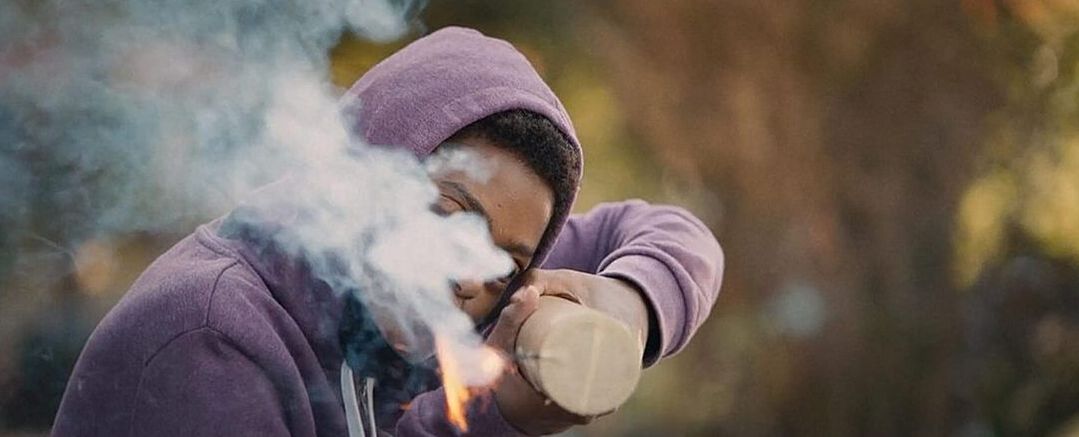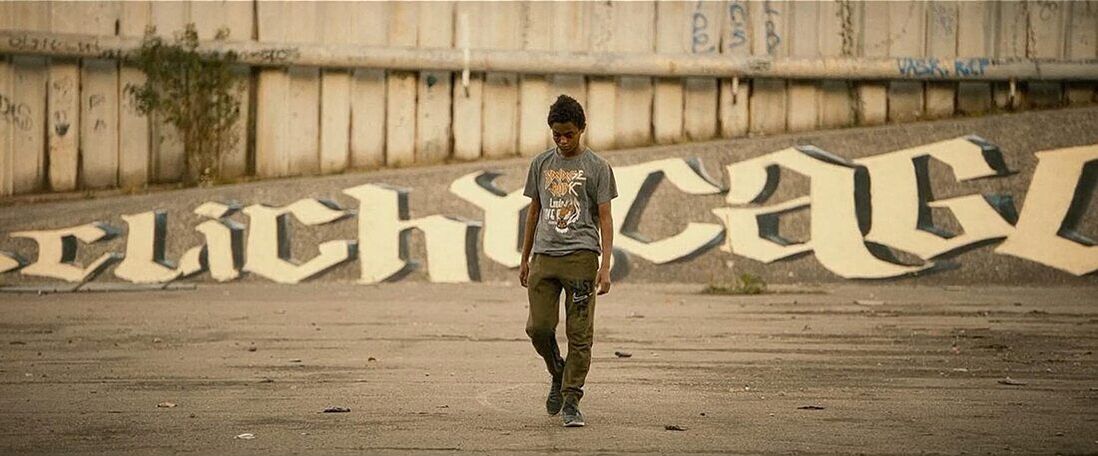LES MISÉRABLES
*****
Director: Ladj Ly
Screenwriters: Lady Ly, Giordano Gederlini and Alexis Manenti
Principal cast:
Damien Bonnard
Alexis Manenti
Djebril Zonga
Issa Perica
Al-Hassan Ly
Steve Tientcheu
Country: France
Classification: MA15+
Runtime: 104 mins.
Australian release date: 27 August 2020.
There’s no soft peddling around life in the Parisian periphery, kids with too much time on their hands and out-of-control police in Malian/French director Ladj Ly’s extraordinarily powerful new film Les Misérables. The title is intentional as the plot has parallels with Victor Hugo’s famous 19th century story of rebellion and upheaval, although the action here is set very firmly in the 21st century. It follows an officer during his first week in a special police unit covering the streets of Montfermeil in eastern Paris, during which time he has to learn to navigate through some very rough water, encountering crews of career criminals, self-appointed local leaders, pumped-up gypsies, Islamist fundamentalists, assorted gangs, lawless children and his own bent, violent colleagues. It’s a baptism of a kind, but not of water, more of blood and fire. Ly knows these mean streets well, having been raised in them himself, but the movie takes a non-judgmental eye to the people and the issues it covers. He says, “Les Misérables is neither pro-lowlife nor pro-cops, I’ve tried to be as fair as possible. I was 10-years-old when I was first stopped and searched by the police, which tells you how well I know cops, how long I’ve lived close by them. Most of these cops aren’t well-educated - they themselves live in difficult conditions, and in the same neighbourhood.”
When seasoned police officer Stéphane is transferred to the Anti-Crime Squad in Montfermeil, his new boss introduces herself by saying, “I appeal to your team spirit. Solidarity. No solidarity, no team. No team, we are alone.” Almost immediately, however, he realises that he is likely to be alone because his new teammates work in very different ways to him. He may have police experience but he’s never worked in the ‘burbs of Paris and is shocked by what he sees. Assigned to be part of a three-man crew led by Chris (Alexis Mananti), a racist bully who regards everyone as a suspect, and Gwada (Djebril Zonga), Chris’s black sidekick, Stéphane is quickly disillusioned and clashes with his partners. As the days pass, the trio patrol the streets dealing with a wide variety of, mostly, petty crime until the day one of these situations escalates, leading to a shocking incident that leaves a child badly injured… and one of them is responsible… and it’s all been recorded on a drone camera belonging to a local kid. For the Anti-Crime Squad, it’s an existential problem, one that leads to a terrible confrontation between the angry teens and the desperate cops.
Les Misérables is in-your-face, political filmmaking at its best, an astonishing piece of work that shows Ly’s documentary roots. In fact, this is the director’s first dramatic feature after a number of short films and docs. He’s also very familiar with the turf, which explains his incredible access to this world. He says that, “Everything in [the movie] is based on actual events: the jubilation of the World Cup victory, of course, the arrival of the new cop in the neighbourhood, the drone, … the gypsies. For five years I filmed everything that went on in my neighbourhood, particularly the cops. The minute they’d turn up, I’d grab my camera and film them, until the day I filmed a real police blunder.” All of which is superbly captured by the athletic lens of Julien Poupard and the stunning editing of Flora Volpelière. No surprise, then, to learn that this was France’s entry into the 2020 Oscars and the winner of the Jury Prize at the Cannes Film Festival in 2019.
“I wanted to show the incredible diversity of these neighbourhoods [shown in Les Misérables]. I still live there: it’s my life and I love filming there. It’s my set!”, Ly says, before continuing with, “the neighbourhoods are powder kegs, there are clans, and despite all this we all try to live together and to avoid everything spinning out of control. I show this in the film - the daily accommodations everyone makes to get by.” It’s a tough system that seems to work surprisingly well but it sure ain’t pretty. It’s a credit to the director and his team that an explosive film like this can emerge from such a powder keg!
Screenwriters: Lady Ly, Giordano Gederlini and Alexis Manenti
Principal cast:
Damien Bonnard
Alexis Manenti
Djebril Zonga
Issa Perica
Al-Hassan Ly
Steve Tientcheu
Country: France
Classification: MA15+
Runtime: 104 mins.
Australian release date: 27 August 2020.
There’s no soft peddling around life in the Parisian periphery, kids with too much time on their hands and out-of-control police in Malian/French director Ladj Ly’s extraordinarily powerful new film Les Misérables. The title is intentional as the plot has parallels with Victor Hugo’s famous 19th century story of rebellion and upheaval, although the action here is set very firmly in the 21st century. It follows an officer during his first week in a special police unit covering the streets of Montfermeil in eastern Paris, during which time he has to learn to navigate through some very rough water, encountering crews of career criminals, self-appointed local leaders, pumped-up gypsies, Islamist fundamentalists, assorted gangs, lawless children and his own bent, violent colleagues. It’s a baptism of a kind, but not of water, more of blood and fire. Ly knows these mean streets well, having been raised in them himself, but the movie takes a non-judgmental eye to the people and the issues it covers. He says, “Les Misérables is neither pro-lowlife nor pro-cops, I’ve tried to be as fair as possible. I was 10-years-old when I was first stopped and searched by the police, which tells you how well I know cops, how long I’ve lived close by them. Most of these cops aren’t well-educated - they themselves live in difficult conditions, and in the same neighbourhood.”
When seasoned police officer Stéphane is transferred to the Anti-Crime Squad in Montfermeil, his new boss introduces herself by saying, “I appeal to your team spirit. Solidarity. No solidarity, no team. No team, we are alone.” Almost immediately, however, he realises that he is likely to be alone because his new teammates work in very different ways to him. He may have police experience but he’s never worked in the ‘burbs of Paris and is shocked by what he sees. Assigned to be part of a three-man crew led by Chris (Alexis Mananti), a racist bully who regards everyone as a suspect, and Gwada (Djebril Zonga), Chris’s black sidekick, Stéphane is quickly disillusioned and clashes with his partners. As the days pass, the trio patrol the streets dealing with a wide variety of, mostly, petty crime until the day one of these situations escalates, leading to a shocking incident that leaves a child badly injured… and one of them is responsible… and it’s all been recorded on a drone camera belonging to a local kid. For the Anti-Crime Squad, it’s an existential problem, one that leads to a terrible confrontation between the angry teens and the desperate cops.
Les Misérables is in-your-face, political filmmaking at its best, an astonishing piece of work that shows Ly’s documentary roots. In fact, this is the director’s first dramatic feature after a number of short films and docs. He’s also very familiar with the turf, which explains his incredible access to this world. He says that, “Everything in [the movie] is based on actual events: the jubilation of the World Cup victory, of course, the arrival of the new cop in the neighbourhood, the drone, … the gypsies. For five years I filmed everything that went on in my neighbourhood, particularly the cops. The minute they’d turn up, I’d grab my camera and film them, until the day I filmed a real police blunder.” All of which is superbly captured by the athletic lens of Julien Poupard and the stunning editing of Flora Volpelière. No surprise, then, to learn that this was France’s entry into the 2020 Oscars and the winner of the Jury Prize at the Cannes Film Festival in 2019.
“I wanted to show the incredible diversity of these neighbourhoods [shown in Les Misérables]. I still live there: it’s my life and I love filming there. It’s my set!”, Ly says, before continuing with, “the neighbourhoods are powder kegs, there are clans, and despite all this we all try to live together and to avoid everything spinning out of control. I show this in the film - the daily accommodations everyone makes to get by.” It’s a tough system that seems to work surprisingly well but it sure ain’t pretty. It’s a credit to the director and his team that an explosive film like this can emerge from such a powder keg!

